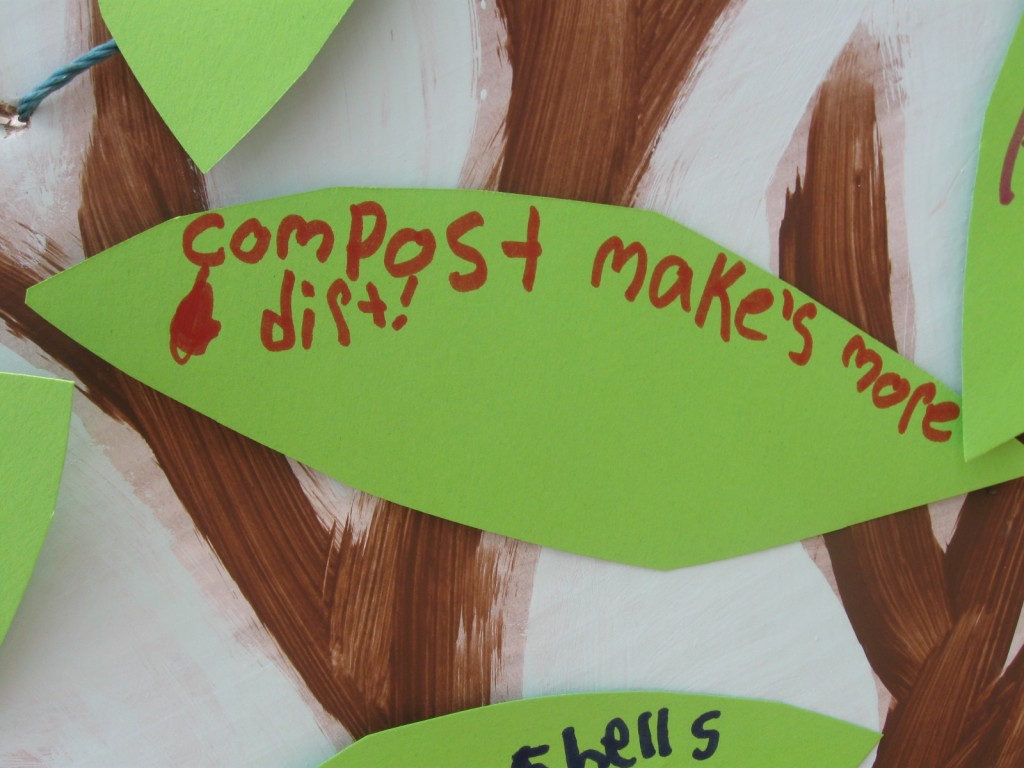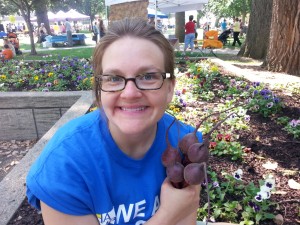I hate compost. I hate how it smells after the coffee grounds, banana peels, onion skins, and the miscellaneous bits of food from the sink catch have been brewing together in the bucket for a couple days. I hate how bits of things always stick to the bottom of the bucket when I try to empty it. And I hate emptying it, stinky compost slime inevitably dripping on my hands, sometimes on my shoes. The only thing I hate more than compost is throwing food scraps in the trash. So I compost.
And actually, I love compost. When it’s finished composting, the dark, rich organic matter is gardening gold. It smells good. I love shoveling it onto my garden beds to feed the next crop of veggies and flowers, parts of which end up back in the compost pile, and are returned to the soil once more. The cycle of compost is an elegant, beautiful thing.

One of the most beautiful things about composting food waste in your backyard is that the valuable nutrients contained in those cooking scraps and forgotten leftovers (sorry, lentil salad!) do not end up in the landfill. According to the Environmental Protection Agency, food waste makes up 21% of the total amount of waste going to landfills and incinerators every year. And, food waste, when it decomposes in the anaerobic conditions present in landfills, produces large quantities of methane, a greenhouse gas 21 times more potent than carbon dioxide. What may seem like a small problem in each individual household quickly adds up to a big problem for the environment.
In Fayetteville, yard waste is collected curbside and diverted to our yard waste composting program—an excellent way to keep those organic materials out of the landfill—but there is no way for the City to compost food waste at this time. This means that the only ways Fayetteville residents can divert food waste from the landfill are a) to not create the waste to begin with (mmm, lentil salad… again…) and b) through backyard composting.
Another remarkable thing about composting is that there is an unexpectedly strong camaraderie among fellow composters. This spring I attended a Master Composter course and met a group of people who could talk all day and with gusto about greens, browns, worms, and bin design. Their enthusiasm was inspiring. (And I learned a life-changing trick I will share with all of you: line your compost bucket with newspaper! You throw the newspaper onto the pile with the food scraps, and you don’t get the goo glaze all over everything! So simple!) The energy with which these lovely people talked about their favorite composting methods (they are not above stealing bags of leaves from their neighbors, or letting bananas go bad just to feed their appreciative worms) made me think that this composting thing has a good chance of catching on with more people.
 With that in mind, I designed a bumper sticker to help spread this composting enthusiasm. It says “We Compost!” and can be placed on actual car bumpers, but I also encourage people to place them on their recycling bins. Neighbors can then see them on trash day, get curious, and ask for tips on how to start composting. Or they might feel more motivated to start the compost pile they always meant to get around to, or to get back into a habit they’d let slide.
With that in mind, I designed a bumper sticker to help spread this composting enthusiasm. It says “We Compost!” and can be placed on actual car bumpers, but I also encourage people to place them on their recycling bins. Neighbors can then see them on trash day, get curious, and ask for tips on how to start composting. Or they might feel more motivated to start the compost pile they always meant to get around to, or to get back into a habit they’d let slide.
I’ve been distributing these bumper stickers at the Fayetteville Farmers’ Market, and they are met with both curiosity and excitement. People share their compost stories, or they ask me how to start composting, or they ask why the Solid Waste and Recycling Division cares whether they compost or not. It has been a great way to start a conversation with Fayettevillians about waste reduction in general and food waste reduction in particular.
It is my hope that as more and more stickers appear across the city, more attention will be paid to an often-ignored everyday issue—one which we all have the power to do something about—and people will be inspired to join the enthusiastic tribe of backyard composters. Eventually we’ll see food waste tonnages decrease and there will be bumper crops of flowers and veggies in yards across the city. Food waste is a lucky problem—it has such a beautiful solution.
Resource cited:
http://www.epa.gov/foodrecovery/
 Nina Prater grew up in Vermont, but relocated to balmy Cedarville, Arkansas in 2007. She lives with her husband and daughter on Cedar Creek Farm, raising animals sustainably and humanely. In 2012, she received her master’s degree in Soil Science from the University of Arkansas, Fayetteville. She is currently serving as an Energy Corps member with the City of Fayetteville Solid Waste and Recycling Division, and is excited to help Fayetteville meet its recycling goals!
Nina Prater grew up in Vermont, but relocated to balmy Cedarville, Arkansas in 2007. She lives with her husband and daughter on Cedar Creek Farm, raising animals sustainably and humanely. In 2012, she received her master’s degree in Soil Science from the University of Arkansas, Fayetteville. She is currently serving as an Energy Corps member with the City of Fayetteville Solid Waste and Recycling Division, and is excited to help Fayetteville meet its recycling goals!








